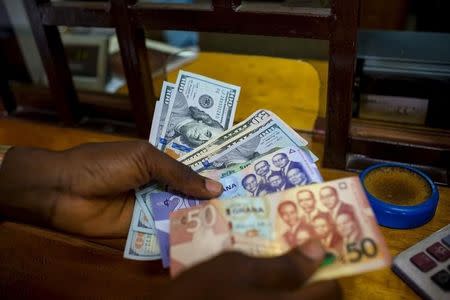Bank of Ghana holds rates; cuts signalled with inflation view

By Kwasi Kpodo ACCRA (Reuters) - Ghana's inflation will fall faster towards government targets than expected, the head of the central bank said on Monday, raising prospects of a cycle of interest rate cuts as it held benchmark borrowing costs at 26.0 percent. Inflation much higher than in comparable African economies has dogged Ghana for years, a symptom of a broader economic crisis that emerged in 2013 with falling commodity prices, forcing the government to seek financing from the International Monetary Fund, which prescribed an austerity programme last year. While Ghana's broad measure of consumer price inflation rose to 16.9 percent in August, having dropped from 19.2 percent since March, the Bank's Governor Abdul-Nashiru Issahaku said core inflation - which excludes energy and utility prices - had continued to fall. Issahaku said inflation would hit the bank's target of 8 percent, plus or minus two percentage points, by the second quarter of 2017 rather than the third as previously forecast. Business leaders and commercial banks say the ultra-high benchmark rate distorts the economy and inhibits growth. Issahaku said the "substantial" fall in inflation would pull rates lower. "It's a bitter pill we are swallowing right now to ensure that stability returns to the economy," he told a news conference after a policy meeting. "The (rate-setting) committee noted the moderation in headline inflation since the July meeting on the back of continued cedi stability, easing inflation pressures and tight credit conditions." Ghana, which earns most of its foreign currency from exports of gold, cocoa and oil, saw the cedi roughly halve in value between 2013 and the end of 2015. This year it has fallen just 4.1 percent and stood at around 3.95 to the dollar on Monday afternoon. The decision to hold rates - for a fifth policy meeting running - was in line with the expectations of analysts polled by Reuters though Razia Khan, head of Africa research at Standard Chartered, had expected a cut of 100 basis points. Khan said the tone of the policy committee's statement was dovish. "Given cedi stability and the Bank's expectation that inflation will still be within the target range by Q2, 2017, any improvement in year-on-year inflation is likely to allow for the start of a sustained easing cycle," he said. Ghana is due to hold an election on Dec. 7 at which President John Mahama will contest a second and final term. Issahaku said the vote was of no relevance to monetary policy. (Writing by Matthew Mpoke Bigg; editing by John Stonestreet)

